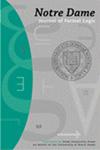Formal Notes on the Substitutional Analysis of Logical Consequence
IF 0.5
3区 数学
Q2 LOGIC
引用次数: 1
Abstract
Logical consequence in first-order predicate logic is defined substitutionally in set theory augmented with a primitive satisfaction predicate: An argument is defined to be logically valid iff there is no substitution instance with true premisses and a false conclusion. Substitution instances are permitted to contain parameters. Variants of this definition of logical consequence are given: Logical validity can be defined with or without identity as a logical constant, and quantifiers can be relativized in substitution instances or not. It is shown that the resulting notions of logical consequence are extensionally equivalent to versions of first-order provability and thus model-theoretic consequence. Every modeltheoretic interpretation has a substitutional counterpart, but not vice versa. In particular, in contrast to the model-theoretic account, there is a trivial intended interpretation on the substitutional account, namely the homophonic interpretation that does not substitute anything. Applications to free logic, second-order logic, and theories and languages other than set theory are sketched. 1 The Substitutional Analysis of Logical Consequence In what could be called semantic theories of logical consequence – as opposed to proof-theoretic analyses –, logical consequence is defined as truth preservation under all interpretations. In model-theoretic semantics, interpretations are conceived as formal set-theoretic models. However, this is only a very recent understanding of interpretation. Traditionally, in order to refute the formal validity of an argument, logicians showed that there is a substitution instance with true premisses but a false conclusion. Such an interpretation is a substitutional counterexample to the argument in question. In the present paper I attempt to revive the substitutional understanding of interpretation and make the informal substitutional account precise in a mathematical setting for first-order predicate logic. The substitutional account of logical consequence advanced in this paper contrasts with earlier substitutional definitions of logical truth and consequence by Quine [20] 2010 Mathematics Subject Classification: Primary 03A05, 03B10关于逻辑推论的替代分析的形式注释
一阶谓词逻辑中的逻辑推论在扩充了原始满足谓词的集合论中被替换地定义:如果不存在具有真前提和假结论的替换实例,则一个参数被定义为逻辑有效。允许替换实例包含参数。给出了逻辑推理的这种定义的变体:逻辑有效性可以用或不用恒等定义为逻辑常数,量词可以在替换实例中相对化或不相对化。证明了所得到的逻辑推论的概念与一阶可证明性的版本是扩展等价的,因此是模型论推论。每一个模型理论解释都有一个替代的对应物,但反之亦然。特别是,与模型理论解释相反,在替代解释上有一个微不足道的意图解释,即不替代任何东西的谐音解释。概述了自由逻辑、二阶逻辑以及集论以外的理论和语言的应用。在与证明论分析相对的所谓逻辑推论的语义理论中,逻辑推论被定义为在所有解释下的真值保持。在模型论语义学中,解释被认为是正式的集合论模型。然而,这只是最近对解释的一种理解。传统上,为了反驳一个论证的形式有效性,逻辑学家证明存在一个替换实例,它具有真前提但假结论。这种解释是对所讨论的论点的替代反例。在本文中,我试图恢复对解释的替换理解,并在一阶谓词逻辑的数学设置中使非正式替换说明精确。本文提出的逻辑推理的替代解释与早期Quine对逻辑真值和推理的替代定义[20]对比。2010数学学科分类:初级03A05, 03B10
本文章由计算机程序翻译,如有差异,请以英文原文为准。
求助全文
约1分钟内获得全文
求助全文
来源期刊

Notre Dame Journal of Formal Logic
MATHEMATICS-LOGIC
CiteScore
1.00
自引率
14.30%
发文量
14
审稿时长
>12 weeks
期刊介绍:
The Notre Dame Journal of Formal Logic, founded in 1960, aims to publish high quality and original research papers in philosophical logic, mathematical logic, and related areas, including papers of compelling historical interest. The Journal is also willing to selectively publish expository articles on important current topics of interest as well as book reviews.
 求助内容:
求助内容: 应助结果提醒方式:
应助结果提醒方式:


